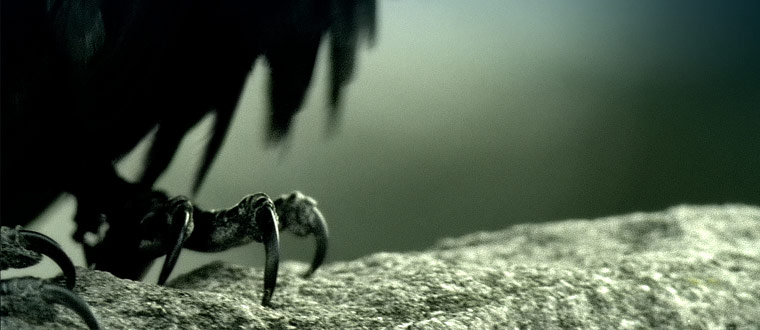Review: Six Feet Under - Series One
Death.
It's the one word which will never become desensitised. The one moment your whole life has been leading up to. When you're voice is silenced and there's things left unsaid.
Now of course there's the afterlife. Heaven and hell depending on your relationship with God. Dust and dirt for the realists. But death is the full stop to a tangible existence. And when you're six feet under; when you're scattered across the Earth or sitting in an earn, your life-once-lived tears apart the lives of the people you once knew. It cripples them with grief, because once someone you love dies, a part of you is stolen and your whole existence is uprooted.
Most of us are fortunate to be touched by the potency of loss only a few times in our life. But what about the people who swallow the poison everyday? The people whose life is death. Whose weekly wage relies on car crashes and heart attacks and cancer? The funeral directors who we pay to deal with death for us.
The screen has seemed to shy away from revealing such an intimate world to the audience for fear of it being too drab, too morbid, and too pessimistic to our preferred genres of politically correct comedy and canned laughter. Or is it just that it's shying away from reality? American Beauty's creator Allan Ball explores this uncharted territory through Six Feet Under, hosted by HBO. Based in the family run funeral home Fisher & Sons the series uses the Fisher couple and their three children to explore what it's like to grow up around death. What it's like for a child to have dead bodies in their basement and mourners in their lounge room. Nate the eldest in denial of his age, David the heavily closeted homosexual, and Claire the aggravated teenager, all dealt with the bizarre childhood in their own way. And whilst each character deals with death all the time, whilst they have to go through the motions of it everyday, when their own father Nathaniel dies they still don't know how to cope.
Meeting the family as they are told about the news of their husband and father's death allows the audience to know them intimately from the very first episode. The moment that you're told someone you love died you remember the time and place and what you were doing in that minute, which resonates as a final memory of them. But Ball pushes the trauma of this further into reality when the characters are doing things they don't want to remember.
Nathaniel dies in that quiet time in the afternoon, just as the dust is beginning to settle, while Claire is in a smoky room high on Crystal Meth with her friends, and Nate is having sex in the airport janitor's closet with Brenda, whom he just met on the flight back home. Ball writes the characters without the sugar coating. We see every flaw they cover up, and watch what they do while they are away from each other. Showing the secret lives they keep from their family makes them brutally honest, easy to laugh at, relatable, and affectionately addictive. And these imperfect personalities set the tone for the rest of the series.
Yet each episode delves much further than just the flaws we hide from each other to avoid judgment to the things which would make our family look at us differently. Or to the aspects of our lives they would never understand. It digs into the secrets we would take to the grave. After Nathaniel's death, his wife Ruth is overwhelmed with the guilt of her adultery. Her face red-hot with tears, she gasps for breathe in panic.
“No I'm not fine,” she screams to her two sons at Nathaniel's funeral.
“I'm a whore! I was unfaithful to your father. With my hairdresser. And now he knows. He knows!”
Perhaps it is the routine of the funeral home, of constantly making up dead bodies to look like sleeping relatives; of constantly covering the present with the past which pushes each member of the Fisher family to hide so much from each other.
Secrecy causes that stinging regret that comes with death. The regret of not knowing them better, of wasted chances and lost time. It is regret which causes Nate to uncover his father's secrecy while attempting to build the relationship-that-might-have-been through the deceased man's possessions.
Throughout series one Nate discovers things he could have never imagined about his father Nathaniel. He finds that the man swapped funerals for oil changes, marijuana and a secret room above a shabby Indian restaurant to escape the family. But with every discovery he only finds more questions - the questions that instantly flood your mind, and never stop floating to the surface of your conscience; the questions of what they did away from you, why they hid it, and why they never felt they could tell you. And the dreaded question of if you ever really knew them at all.
But a show with no suspense,which reveals all the answers straight away would be unrealistic. Through his series Ball says life doesn't give answers. Life is the suspense that happens while you're trying to find out. And death is the curtain in front of the unpredictable ending.
The audience has never been confronted with death so candidly in the same way as Six Feet Under. They are forced to face it with each episode as it opens with the final scene in someones life. We are invited to watch their intimate last moments whether it be a man cut up in a dow mixer, a porn star electrocuted while having a bath, or a newborn taken by SIDS. The soul of each dead body which comes through the Fisher home detaches itself from its body and comes to life in the imagination of the characters. We see these souls with gory proof of their death bruised across their faces and bodies, but speaking to the characters like they are alive. They become the main characters' suppressed thoughts; the little voice that you push to the back of your mind. That voice that says the things you are afraid to think.
The soul of a young gay man who was bashed to death on the street comes alive in David's imagination and verses his faith in God and his homosexuality together. The soul looks onto his own lifeless body as David covers up the gashes and prepares it for viewing.
“I never should have liked men,” he says, his face pink and purple with bruises. “I could have had a nice life, I could have had a normal family. You could have too.” As if it were a normal conversation David answers back, “That life would have been a lie, and completely unfair to your wife and children who would have hated you.”
The soul smirks at David and leans close into his ear,“ Not if I never looked back. Not if I had faith. God challenges us like this so we'll chose good. So we'll triumph over evil. Only thing is so few of us do... No matter how nice you fix me up I'm going to hell, and you know it. 'Cause you're going too.”
David pulls the sheet over the body's face in anger and backs away to lean against the wall, glaring at it. That camera corners him against the wall, allowing the audience to see David as the dead man does – cowering in a corner.
The concept of the dead body which looks and talks as if it were still alive hints that everybody has something to say. Everybody has something to teach, whether it be in this life, or beyond the grave. Like Nate's constant discoveries about his deceased father, it says that you never stop thinking about or understanding someone once they are gone. Even though they're not physically there, you still learn from as if they were.
We live in a culture that wants to deny death exists. On the screen characters only ever die at the end, and we never see the agony of loss that the other characters have to face. And yet we also trivialise death through slasher films which make it seem more like a fantasy. But Six Feet Under shows the discomfort we have with grieving. Finally the audience can see it clearly in a detached view while they look over Ruth's shoulder as she gazes at her husband in his coffin at his funeral. She begins whimpering, her lip quivering at the little strength she has to hold back the tears. She turns away covering her mouth with her handkerchief and David ushers her into a small room behind a curtain so the other attendees don't see her mourning. Nate watches in disbelief that her mother has to be hidden when showing any emotion.
“What? She's sad so he has to get her out of sight? Why? Why does it have to be such a secret? It's nothing to be ashamed of. He was our father. The only father we're ever gonna have and he's gone. Forever. And that sucks, but it's a God-damned part of life, and you can't really accept it without getting your hands dirty. Well I do accept it and I intend to honor the old bastard by letting the whole world see just how how fucked up and shitty I feel that he's dead.”
Six Feet Under is about that paralysing grief. That inescapable grief. That grief that freezes through you into your bones. It doesn't take the reality away and hide it behind a curtain so it's not too confronting for the viewers. It makes them uncomfortable because its raw. Its inflamed. Its naked. It forces the audience to face their mortality. To not be afraid of it. And to understand that “people have to die, to make life important".

